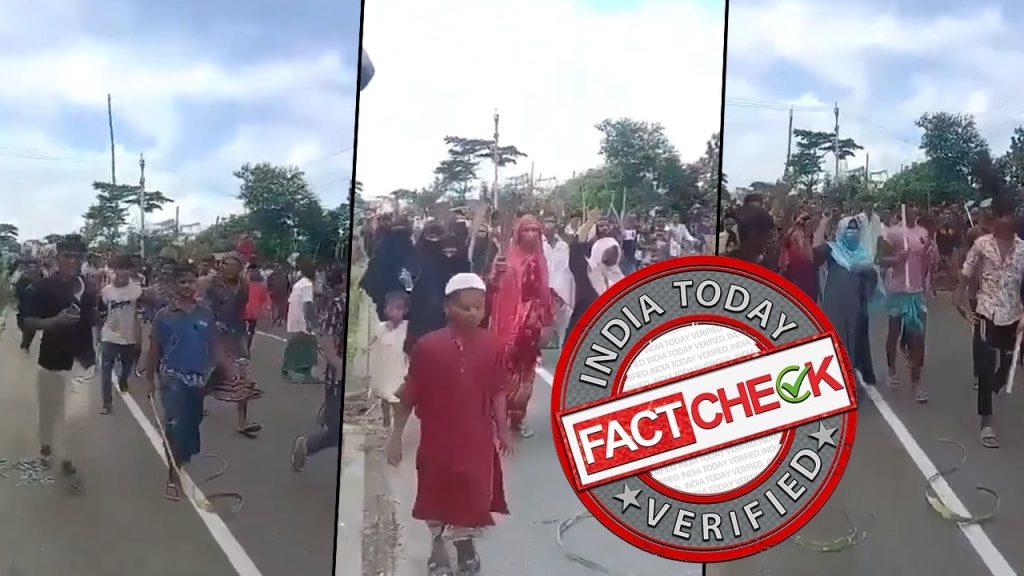Listen to the article
In a case of misinformation spreading across social media, a viral video purportedly showing protests against India’s voter verification process has been debunked as footage from an entirely different country.
The video, which shows hundreds of protesters marching down a road carrying sticks and brooms, was widely shared with claims that it depicted illegal Bangladeshi and Rohingya migrants protesting against the Special Intensive Revision (SIR) of voter rolls in West Bengal, India.
Social media posts accompanying the footage included captions such as, “See how they have come out against SIR (Special Intensive Revision of Voters’ List) in West Bengal. Illegal Bangladeshis and Rohingyas must be deported.”
However, a fact-check investigation has confirmed that the video originated from Bangladesh’s Faridpur district and is completely unrelated to any events in India.
The investigation traced the video to a Facebook post dated September 15 by a user named Biplob Biplob, whose profile indicates he resides in Faridpur, Bangladesh. The post, written in Bangla, simply described the footage as “Video clip from today’s protest.”
When contacted directly, Biplob confirmed that the video shows demonstrations in the Bhanga area of Faridpur district. He explained that the protests were in response to the Bangladesh Election Commission’s decision on constituency demarcation, which has become a contentious issue in the region.
“This decision has hurt the livelihood of the locals as the distance to the nearest administrative office has now become nearly 40 kilometers,” Biplob said. “For the time being, we have paused our protest as a case has been registered against this demarcation in court.”
The timing further disproves the false narrative surrounding the video. The Election Commission of India announced the SIR exercise for West Bengal and 12 other states and Union Territories on October 27, more than a month after the Bangladeshi video was first posted online.
Several respected Bangladeshi news outlets, including The Business Standard, The Daily Star, and The Dhaka Tribune, published reports in September about widespread protests across multiple districts following the Bangladesh Election Commission’s gazette notification that redrew the boundaries of 46 constituencies throughout the country.
The circulation of this misleading content comes at a politically sensitive time in West Bengal. The Indian state, which shares a border with Bangladesh, is preparing for Assembly elections, and the announcement of the Special Intensive Revision of voter rolls has brought border security and migration issues into sharp focus.
Recent reports have indicated that following the SIR announcement, border security forces apprehended individuals allegedly attempting to cross from India into Bangladesh. This context likely contributed to the environment in which false narratives about the video could gain traction.
This incident highlights the increasingly common problem of decontextualized videos being repurposed to support political narratives, particularly around issues of immigration and border security. Social media platforms continue to serve as vectors for such misinformation, especially during politically charged periods preceding elections.
The case also underscores the importance of cross-border fact-checking and verification in the interconnected media landscapes of South Asia, where content from one country can easily be misrepresented as occurring in a neighboring nation, potentially inflaming existing social and political tensions.
Fact Checker
Verify the accuracy of this article using The Disinformation Commission analysis and real-time sources.




8 Comments
The ability to trace the origin of this viral video and confirm its true source is a testament to the importance of investigative journalism and fact-checking. Maintaining accuracy should be the top priority.
Agreed. Fact-checking is a vital tool to combat the proliferation of false narratives, particularly around sensitive political and social issues. It helps uphold journalistic integrity and public trust.
Interesting case of misinformation spreading across social media. Fact-checking is crucial to avoid the spread of false narratives, especially around sensitive political issues.
Agree, it’s important to verify the source and context of viral videos before jumping to conclusions. Fact-checking helps maintain accuracy and prevent the proliferation of disinformation.
This highlights the need for greater media literacy and critical thinking when consuming online content. Relying on unverified social media posts can lead to the propagation of misleading information.
Absolutely, we must be vigilant and cross-check claims, especially when they involve politically charged issues or protests. Fact-checking is essential to maintain an informed public discourse.
This case highlights the need for greater scrutiny of online content, especially when it comes to claims about protests and political events. Verifying the source and context is crucial to avoid the spread of misinformation.
While protests and political tensions are newsworthy, it’s crucial that the reporting is accurate and based on verified information. This case serves as a cautionary tale about the spread of misinformation online.